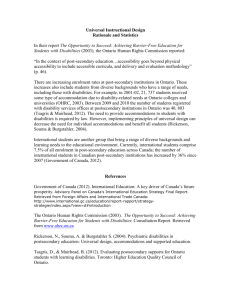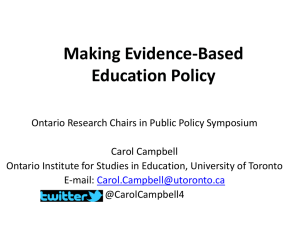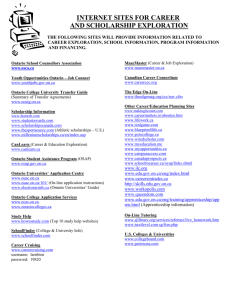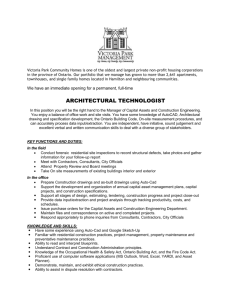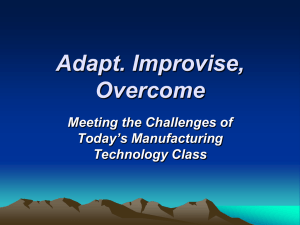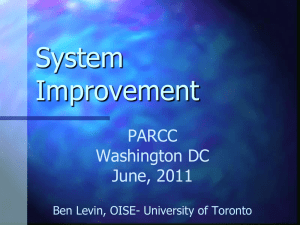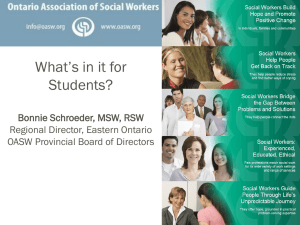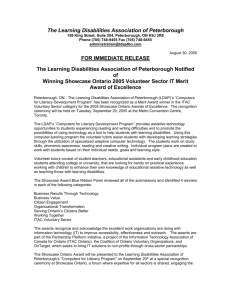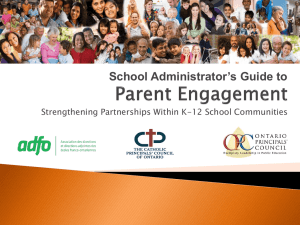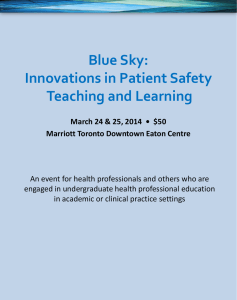Guardianship, Substitute or Supported Decision
advertisement
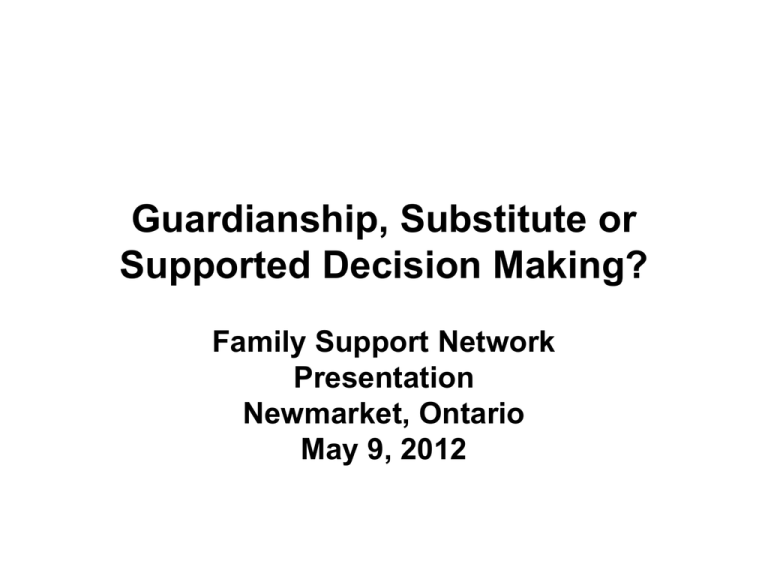
Guardianship, Substitute or Supported Decision Making? Family Support Network Presentation Newmarket, Ontario May 9, 2012 A Bit of History 1992: “FROM PATERNALISM TO PARTNERSHIP: DEVELOPING LEGAL APPROACHES THAT REINFORCE RATHER THAN DISREGARD THE CAPACITY OF PERSONS WITH MENTAL DISABILITIES TO MAKE CHOICES” Some Guiding Principles • “There is no need to limit me” • Social inclusion must mean participation in decision making • If you “replace” a person, that person has lost their unique personhood • “Nothing about us without us” Some undisputed realities • No one is without ability; each of us has limited ability. • Everyone has a will, meaning a set of preferences, intentions and wishes. • Important decisions are hardly ever made by any of us in a social vacuum. • You need to have choices available that are worth making so you will have meaningful practice in making decisions. • Any scheme adopted for making decisions must meet the test of reducing the vulnerability of the person. Traditional “Capacity” Standards • “Able to understand information that is relevant to making a decision” and • “Able to appreciate the reasonably foreseeable consequences of a decision or lack of decision” • Only “yes” or “no” – no room for “no, but … – “yes, with support” Canadian Charter of Rights and Freedoms • Section 15: “Every individual is equal before and under the law and has the right to the equal protection and equal benefit of the law without discrimination and, in particular, without discrimination based on … mental or physical disability” • Section 7: “Everyone has the right to life, liberty and security of the person and the right not to be deprived thereof except in accordance with the principles of fundamental justice” UN Declaration on the Rights of Persons with Disabilities Ratified by Canada in March 2010 • Article 12: – 1. “the right to recognition everywhere as persons before the law.” – 2. “recognize that persons with disabilities enjoy legal capacity on an equal basis with others” – 3. “take appropriate measures to provide access by persons with disabilities to the support they may require in exercising their legal capacity” Role of UN Convention • Domestic statutes ought to be understood as far as possible to conform with international human rights obligations. Ontario Substitute Decisions Act Subsections 22(3) (property) and 55(2) (personal care): Prohibition The court shall not appoint a guardian if it is satisfied that the need for decisions to be made will be met by an alternative course of action that, (a) does not require the court to find the person to be incapable of personal care; and (b) is less restrictive of the person’s decision-making rights than the appointment of a guardian. Gray v. Ontario (2006) • “Where alternatives to the appointment of a guardian will allow for decisions to be made concerning an individual’s personal care, this is to be preferred to a guardianship order, which requires a finding that the person is incapable of personal care.” Gray v. Ontario (cont’d) • “A process short of full or partial guardianship is preferable in many cases, as it best recognizes the autonomy and dignity of the individual and the inclusiveness of the decision-making process.” Ontario Human Rights Code • 34(5) Application on behalf of another A person or organization may apply on behalf of another person to the Tribunal if the other person, (a) would have been entitled to bring an application under subsection (1); and (b) consents to the application. • Note: “on behalf of” is not the same as “instead of” Kacan v. Ontario Public Service Employees Union – April 12, 2010 • “Where appropriate, decisions should be made by the applicant together with the claimant and with respect for her wishes, which is how Ms. Kacan and Ms. Korevaar intend to conduct this application” Kacan v. Ontario Public Service Employees Union (cont’d) • “A mutual understanding and implicit undertaking by the applicant to act in the best interests of the claimant” • Adjudicator sees UN Convention Article 12 as clear support for his interpretation of section 34(5) Registered Disability Savings Plan • A major national set-back • Adults could only open an RDSP if they were “contractually competent” • Anyone wishing to open an RDSP for an adult who is not “contractually competent” had to become that person’s “guardian” or be otherwise “legally authorized” to make financial decisions for the person R.D.S.P. (cont’d.) • 2012 Federal Budget announced that, beginning this summer and until 2016, an adult who is not “contractually competent” can have an R.D.S.P. opened for her by her parent or spouse. • Finance Minister Flaherty says it is up to the provinces and territories to introduce supported decision-making legislation. “I want to donate blood” • 17-year-old Essex County resident Yanhong Dewan wanted to donate blood. • Canadian Blood Services rejected her as a donor because they believed she did not understand the questions in their screening questionnaire. • What should have been done? “Competency”: the person or the process? • What are the standards that make a decisionmaking process “competent”? – – – – – Preservation of true “personhood” No exclusion of the person Can be (and is) trusted to act morally and ethically Freedom from conflict of interest Not guided by someone else’s concept of what is in the person’s “best interests” – The person “enjoys” legal capacity! Questions from the Event Flier • Who should have the right in making decisions when the parents are gone? • What are the present legal rights of our children and adults in Ontario? • How do we decide which decision is best for our adult child? Canadian Association for Community Living position paper: • “We believe that legal capacity is a fundamental right, regardless of perceived level of disability or support required to exercise it. No one should be excluded from the process of making decisions about their lives. • “People with significant support needs or those who do not communicate or express themselves in ways that are easily understood by others must have a continued presence in the decision-making process.”
